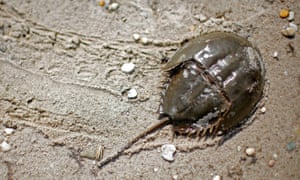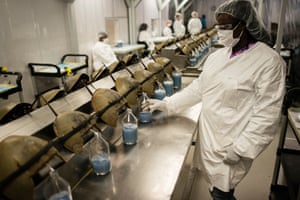https://www.theguardian.com/environment/2020/may/31/crab-blood-to-remain-big-pharmas-standard-as-industry-group-rejects-substitute
Horseshoe crab blood to remain big pharma's standard as industry group rejects substitute
Animal rights groups have been pushing a synthetic alternative to horseshoe crab blood in drug safety testing
Horseshoe crabs’ icy-blue blood will remain the drug industry’s standard for safety tests after a powerful US group ditched a plan to give equal status to a synthetic substitute pushed by Swiss biotech Lonza and animal welfare groups.
The creatures’ copper-rich blood clots in the presence of bacterial endotoxins and has long been used in tests to detect contamination in shots and infusions.
More recently, man-made versions called recombinant Factor C (rFC) from Basel-based Lonza and others have emerged.
An industry battle has been brewing, as another testing giant, Lonza’s US-based rival Charles River Laboratories, has criticised the synthetic option on safety grounds.
Maryland-based US Pharmacopeia (USP), whose influential publications guide the drug industry, had initially proposed adding rFC to the existing chapter governing international endotoxin testing standards.
USP has now abandoned that, it announced late on Friday, opting instead to put rFC in a new stand-alone chapter. This means drug companies seeking to use it must continue to do extra validation work, to guarantee their methods of using rFC tests match those of tests made from horseshoe crab blood.
The decision gives the drug industry fewer incentives to end its reliance on animal-based tests, even as companies like Lonza and France’s bioMerieux promote man-made alternatives and wildlife advocates worry about horseshoe crab bleeding’s effect on the coastal ecosystem.
USP told Reuters on Sunday its experts concluded there was too little practical experience with drug products tested with rFC to put the synthetic tests on equal footing with horseshoe crab blood tests, which have been widely used for decades.
“Given the importance of endotoxin testing in protecting patients ... the committee ultimately decided more real-world data [was needed],” USP said in a statement, adding this approach will give the US Food and Drug Administration flexibility to work with drugmakers on rFC validation requirements.
USP did say it supports efforts to shift to rFC tests, including for potential testing of Covid-19 medicines or vaccines, where it is offering technical assistance.
Endotoxin tests number 70 million annually and estimates put the relevant market at $1bn annually by 2024.
Eli Lilly, one drugmaker that has shifted to synthetic tests for drugs like its migraine treatment Emgality, has said rFC is safe and that the extra validation requirements have been a hurdle to adoption by more companies.
Conservationists, including advocates for migratory birds that dine on horseshoe crab eggs on the US east coast, have also been pushing for rFC’s increased use to take pressure off crabs, some of which die after being returned to the Atlantic Ocean following bleeding.
Lonza did not immediately comment on USP’s move. Charles River also did not return a request for comment.
The New Jersey Audubon Society and Delaware-based Ecological Research & Development Group, a crab conservation group, did not respond to messages seeking comment.
• This article was amended on 2 June 2020 to remove any general references to “crabs”. Horseshoe crabs are not actually crabs, or crustaceans of any sort, but belong to their own class of arthropod called merostomata.
We've never had a better chance ...
… to make a greener world. Covid-19 has delivered unusual environmental benefits: cleaner air, lower carbon emissions, a respite for wildlife. Now the big question is whether we can capitalise on this moment. The Guardian aims to lead the debate from the front.
In the weeks and months ahead, our journalism will investigate the prospects for a new green settlement. We will showcase the big thinkers and protagonists and amplify the arguments for authorities everywhere to consider as they lead us out of coronavirus.
Our credentials suit us well to the task: we are independent, we have no owners, no paymasters or oligarchs pulling the strings. We have committed to carbon neutrality by 2030, divested from the oil and gas sectors and renounced fossil fuel advertising. But at this crucial moment, news organisations like ours are facing a daunting financial challenge. As businesses everywhere feel the pinch, the advertising revenue that has long helped to sustain our work has plummeted. We need you to help fill the gap.
Our journalism is open to all because we believe everyone deserves access to factual information, regardless of where they live or what they can afford to pay. If you can afford to, we hope you will consider supporting our journalism today.
The Guardian believes that the climate crisis we face is systemic. We will inform our readers about threats to the environment based on scientific facts, not driven by commercial or political interests. We will keep reporting on the efforts of individuals and communities around the world who are fearlessly taking a stand for future generations and the preservation of human life on earth. We want their stories to inspire hope.
We need your support to keep delivering this kind of open, committed independent journalism. Every reader contribution, however big or small, is so valuable. Support the Guardian from as little as $1 – and it only takes a minute. Thank you.


沒有留言:
張貼留言